#tyk symbolism
Text
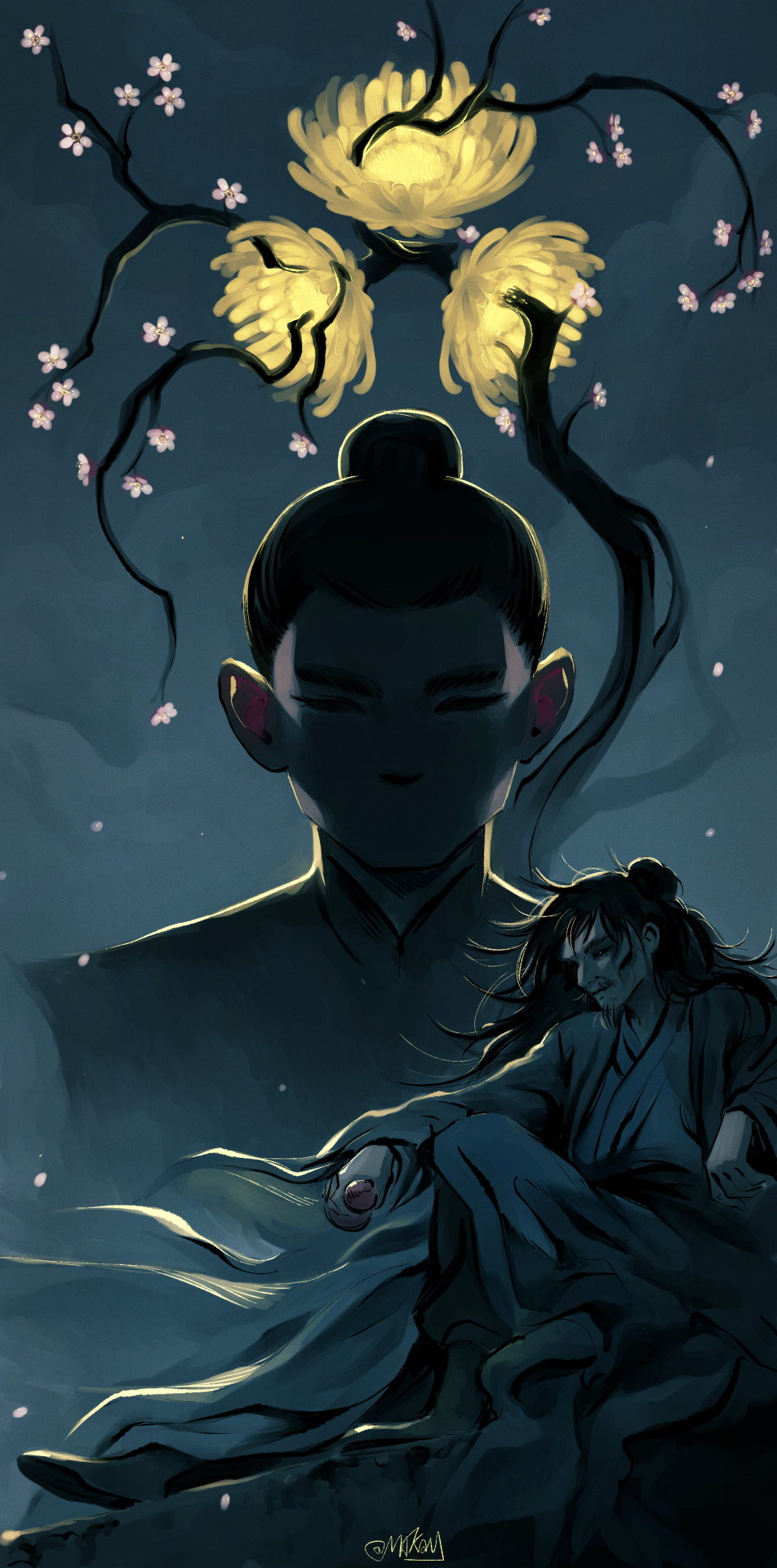
A portrait of Zhou Xu.
There is quite a bit of background behind this image, so allow me to ramble about TYK!Siji manor and QY!Tian Chuang a little :
The three yellow flowers in the top are the symbol of Siji Manor in TYK. It comes from the following description in Extra 5 : Wandering Jianghu :
[...] You may ask from god-know-where does this three golden flower pattern come from? [...] From then on, they receive salaries from the royals and no longer work in jianghu, but that flag with the golden flower is definitely a token of Four Season Manor.
I looked up the original, and no flower species was specified; I was then advised japanese chrysanthemum by Bichen, which I thought was aesthetically very interesting. I first used it for my personal design of the TYK!Siji manor uniform :

I have many, many headcanons regarding TYK!Siji. Here is another citation, from Extra 5 still, that I use for my conception of it :
People of the same age group as this lowly old man must all have heard of Four Seasons Manor. This Manor was built by an eccentric figure while the previous emperor was still ruling. Nobody even knew of his name, but everyone from that Manor was similarly mysterious. They were experts in disguising their faces, their qinggong was extraordinary, and while none knew who their manor lord’s shifu was, or even his real face, the manor lord was the either the best or second-best martial artist.”
“The Four Season Manor dealt in the business of secrets; it was said there was nothing in this world that they could not investigate, so there were hordes of people spending fortunes to buy information from them.
In the book, ZZS also compares the Scorpions to Siji Manor more than once, and even comments on how they're just "lesser versions" of Siji. From there, I like to think that ZZS learned everything from Qin Huaizhang, and that the manor's practices were quite similar to Tian Chuang's.
The curious part about ZZS' story is that he inherited the manor so young. There have been several discussions within servers I'm in about whether or not ZZS was QHZ's oldest disciple, but I like to think that he wasn't . In Qi Ye, one of ZZS' acolytes, Lu Yu, also excells in disguise, so has a good chance of being from Siji himself; however, his age isn't disclosed, hard to draw a conclusion from there, and I would guess that it is up to interpretation. My personal headcanon is that ZZS wasn't the oldest, but he was certainly the craftiest, the kid whom QHZ saw as resembling himself the most, and that's what decided him.
What ZZS had in him, however, was the seed of something much bigger than Siji Manor itself, and he ultimately brought the manor to its abandon- moved to the capital, gave the organisation a new name, and ultimately left. I love to visualise Siji!ZZS as this faceless, ominous person - a genius, an unstoppable force (the plum tree) that can't simply keep things as they are, that is bound to move, to bring things-the country itself- forward, even if it means a great deal of destruction - destruction of the manor, destruction of lives, commoners, nobles, manor brothers, destruction of himself.
One of my 7 nails illustration played on that imagery too. I will put it back here since it kind of resonates with the portrait above and with my headcanon.

I have an idea for another illustration that would have ZZS and the manor shixiongdis standing in the manor's courtyard, probably in a specific stance; but ZZS is, again, a faceless entity, while the others are pierced through (or even articulated like puppets) by plum tree branches. The manor behind would be also taken over by giant plum tree roots and branches.
Back on the plum tree imagery : the TC courtyard is decorated with plum trees, and the nails themselves smell like plum blossom. In Qi Ye, although this is never brought up again, TC agents have a plum tree branch tattooed on their forearm.
Plum trees grow fast, from the research i have made. They have beautiful, thick black trunks and delicate flowers that range from white to red. In the first lines of TYK, it is impossible to distinguish the white petals of plum blossoms from the snow on the ground.
In Qi Ye, what has to be ZZS' most atrocious crime happens during the winter, as snow is falling.
I think I'm just extremely fond of that symbol which, in my opinion, is well chosen. The plum tree is persistent even in winter. Its petals scatter everywhere, light as snowflakes, hard to catch. And its trunk is strong, dark, and growing fast, yet it looks so delicate; its petals sometimes taking a deep red tint, as if stained with blood. Whether for TC or ZZS himself, it's just great.
Anyway. I guess the rest is self-explanatory, haha.
I really like Zhou Zishu, by the way.
207 notes
·
View notes
Text
“The mountains and the rivers aren’t important, what’s important is that to find someone who understands one’s self.” - Wen Kexing’s Romantic Poetry Episode 9 aka the soulmate 知己 meta (Warrior's March 壮士行 by Bao Rong 鲍溶)
To wrap up the soulmate meta, let’s analyse the second instance when the poem appears.
“The Warrior’s March 壮士行” was written by the Tang Dynasty poet Bao Rong 鲍溶. n his early years, he lived in seclusion in the mountains of Jiangnan. He later then traveled around the world, making friends with Han Yu, Li Zhengfeng and Meng Jiao. He was a scholar in the fourth year of Yuanhe (809), but his career was unpromising, and he died in his hometown after a life of poverty and uncertainty.
西方太白高,壮士羞病死。
Venus rises high in the west, the warrior dies filled with regret.
心知报恩处,对酒歌易水。
His heart knows that kindness has been repaid. Drinking his wine, the warrior sings the “Cold River Yi”
易水寒 Cold River Yi - This poem was written by the youxia Jing Ke 荆轲 written during the Waring States. When he was on his way to assassinate the emperor, he sings his goodbyes to the King of Yan at the River Yi (located in Hubei.). The same story has been referenced in the previous meta Singing for Jin Ke 咏荆轲.
砂鸿嗥天末,横剑别妻子。
The geese in the desert howl as though the world has ended. Carrying his sword, he bids his wife and children goodbye.
苏武执节归,班超束书起。
Su Wu holds the up the Tally and returns, Zhong Sheng puts his books down and rises.
苏武 Su Wu’s was a Han Dynasty minister who was was captured by the Xiongnu for 19 years. Emperor Xuan of Han Dynasty listed him as one of the eleven meritorious ministers of the Qilin Pavilion 麒麟阁 for his integrity. He’s often depicted in Chinese history as a symbol of loyalty despite hardship
执节 The Tally was a form of military authorisation in ancient China. One example would the the Tiger Tally, that was the inspiration behind MDZS’ Yin Tiger Tally/Yin Hufu.
班超: Banchao was a famous literary figure, military man and diplomat during the Eastern Han Dynasty. He was ordered to send an envoy to the Western Region and pacified more than fifty countries over thirty years, making great contributions to the return of the Western Region and promoting national integration.
山河不足重,重在遇知己。
The mountains and the rivers aren’t important, what’s important is that to find someone who understands one’s self. (ie. Soulmate)
Analysis
This is a really interesting choice of poetry!
Firstly, there are many ways 知己 Zhiji’s quoted in poetry. It is a term used to refer to “someone who knows one’s self.” On Baidu, it has been used at least 7 times in ancient poetry. But what’s really interesting is that both poems share the story of Jin Ke’s failed assassination attempt of Qin Shi Huang. I felt this was a deliberate choice by SHL because 1) this line doesn’t appear in TYK and 2) it isn’t even a famous poem. Chinese dictionaries use ancient poetries to define a term and this poem isn’t listed on it. (At least on Baidu dictionary.). In fact, I pieced the complete translation myself. LOL. Famous works would usually have been fully interpreted and translated by Chinese literature fans, and this was only partially translated
Secondly, what’s really interesting is the vibe of this poem. The line seems romantic at first glance when quoted on its own (The mountains and the rivers aren’t important, what’s important is that to find someone who understands one’s self. (ie. Soulmate)), but when taken into the context of the entire line, it just simply reeks of loneliness. Rather than proclaiming about how great their current soulmate is, the line’s actually about how one’s in anguish over their missing soulmate, and in this case, it’s over the death of their soulmate. (Ie. saying goodbye to their love ones while embarking on a doomed mission.)
26 notes
·
View notes
Text
I’m sort of fixated on the idea of bad omens haha.
In Spanish there’s this saying “raise crows and they will gouge your eyes out”, originally it was about bad parenting (I think? Like u rip what u sow vibe) but people actually use it to scold unfilial children and in general to shame someone who has taken advantage of the help given.
A while ago I was reading about bird symbolism in China and it said owls were considered a bad omen. It mentioned a legend in which owls would gouge their mother’s eyes before flying the nest, and I thought it was so interesting how the two things overlapped even though there’s no correlation.
I thought of wen kexing right away. I know his story about the owl is in regards to his parents’ death, but (especially in SHL) the altered saying “raise owls and they will gouge your eyes out” can be applied to him and the previous ghost valley master. In TYK he ascended quietly but in SHL the master personally trained him to succeed him (my match in the ghost valley zine, narie, has an amazing fic in the works about him) but it’s up for debate whether he thought wkx would spare him at the end or not, or if he’d end him so violently.
Crows are also seen as a bad omen in Chinese symbolism, but they’re also symbols of filial piety. We don’t really know zhou zishu’s background in relation to his family beyond a couple of details, but in terms of artificial bonds (his master, jiuxiao) I couldddd be said it fits? Mayhaps.
Either way, crow zzs and owl wkx.
#ramblings#i am indeed sleep deprived#If this is a wrong characterization just ignore it haha#tqs thoughts
12 notes
·
View notes
Text
Cashmere Bukser til Damer og Herrer: Luksus og Komfort i Ét

Introduktion
In the fashion world, women's cashmere pants have become a symbol of luxury and comfort. Made from the finest cashmere wool, these pants are not only comfortable to wear, but they also add a sense of elegance to any wardrobe. This article will explore the world of cashmere pants and find out why they have become so popular among both men and women.
Cashmere Uld: En Ædel Ressource
Inden for tekstilindustrien er cashmere kendt som "det sorte guld", og det er ikke svært at forstå, hvorfor. Cashmeregeden, der lever i Himalayas kolde klimaer, er kilden til ulden. Cashmeregeden danner en tyk, blød underuld med fine hår for at beskytte sig mod kolde temperaturer. Det er disse hår, der bruges til at lave den fine cashmereuld, der er kendt for sin fantastiske varme og blødhed.
Denne fine uld skaber cashmere bukser, der er lette og behagelige mod huden og giver en fantastisk varmefølelse. Cashmere bukser er det ideelle valg til de kolde vintermåneder, fordi de tilføjer varme og komfort.
Elegance og Stil
Cashmere bukser er primært valgt af både mænd og kvinder på grund af den uovertruffen elegance, de tilføjer til enhver påklædning. Uanset om det er cashmere bukser herre eller damer, har de en stil, der er både tidløs og sofistikeret, hvilket gør dem passende til både hverdagsbrug og mere formelle lejligheder.
Cashmere bukser er tilgængelige i en bred vifte af stilarter og farver, så de kan passe til enhver smag og lejlighed. Mens kvinder kan vælge mellem figursyede modeller, der fremhæver deres silhuet, kan herrer vælge mellem moderne designs og klassiske snit. Cashmere bukser, uanset hvad du foretrækker, vil altid tilføje raffinement til din påklædning.
Komfort uden forbehold Cashmere buksers utrolige komfort er en af deres bedste egenskaber.
Cashmere uld er utroligt blød og behagelig mod huden, og bukser lavet af denne luksuriøse uld føles som en drøm at have på. De er lette, åndbare og tilpasser sig kroppens form for at give den optimale pasform og komfort.
Derudover er cashmere bukser slidstærke og holder sig smukke i mange år, hvis de plejes ordentligt. Dette gør dem til en investering i kvalitetstøj, der vil bringe glæde i lang tid fremover.
Vedligeholdelse af Cashmere Bukser
At pleje dine cashmere bukser korrekt er afgørende for, at de forbliver smukke og holdbare. Dette er nogle få enkle råd til vedligeholdelse:
Vask hånden eller brug en skånsom maskinvask med koldt vand og et mildt vaskemiddel til uld.
Når bukserne er våde, skal du undgå at straekke eller vride dem.
Tør dem fladt på et tørrestativ, så de forbliver fine.
Cashmere bukser bør holdes væk fra solen og i en åndbar pose eller skuffe.
Konklusion
Cashmere bukser er et symbol på både luksus og komfort. Deres bløde og varme egenskaber gør dem til det ideelle valg for de kolde vintermåneder, og deres stilfulde udstråling gør dem ideelle til enhver lejlighed. Cashmere bukser er en investering i kvalitet og stil, der vil holde dig glad og velklædt i mange år fremover, uanset om du vaelger dem i en klassisk eller moderne stil. Derfor, hvad med at tilføje et par cashmere bukser til din garderobe i dag for at opnå den perfekte kombination af komfort og elegance?
0 notes
Link
1 note
·
View note
Note
hi~, for the artist ask thing, I'm really curious about 10, 14, 20, and 27?
10) Favorite piece of clothing to draw:
Hmm definitely coats/outer robes. Bonus points if they're long! I love drawing fabrics that drag and drape 😩👌
14) Any favorite motifs:
Sort of! Always love using birds and flowers for their meanings, mostly. I'll sometimes use flowers based on their meaning, although that's something that varies highly so I end up reinforcing symbolism with color as well. Also always luv draw two birds together to suggest romance, I've put that in a few of my tyk fanart 👀👀
20) Something I like to draw that not everyone likes drawing:
I fucken love drawing hands so much. Like god they're a pain but also somehow so fun !!
27) Do I warm-up before getting to the good stuff?
Uhhh Yes but also No 🤣🤣 if I'm working on a comm or big piece for an event or something, I do stretches and warm up with line weight practice! I like to do the zebra stripes practice, where you draw a line down the page alternating between heavy > light and light > heavy pressure. I also do circle and spiral practice to loosen up my hand before getting to work....half the time I'm too lazy for that shit though 🤣 and I tend to work on multiple pieces at a time in sprints so like....does fussing with sketches count as a warm-up?? LMAO
thanks for the ask!! ❤️❤️❤️
1 note
·
View note
Photo
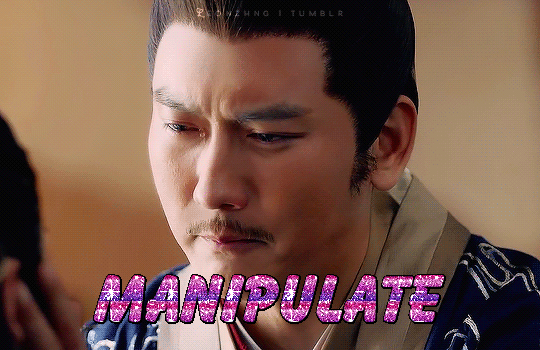

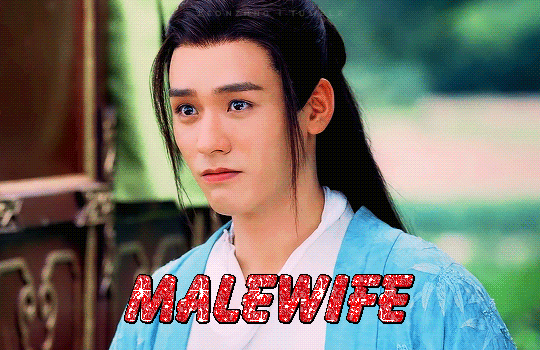
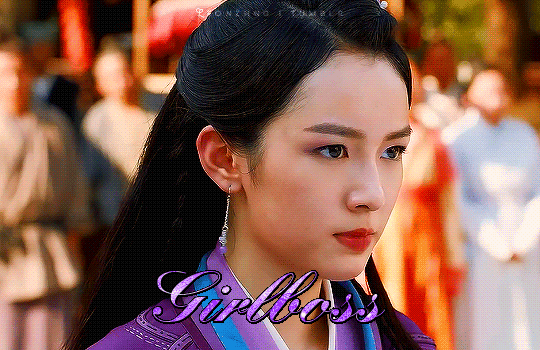

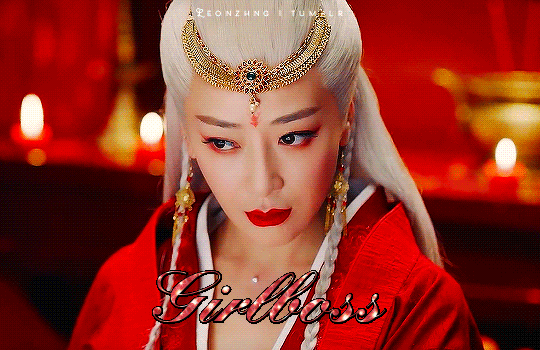
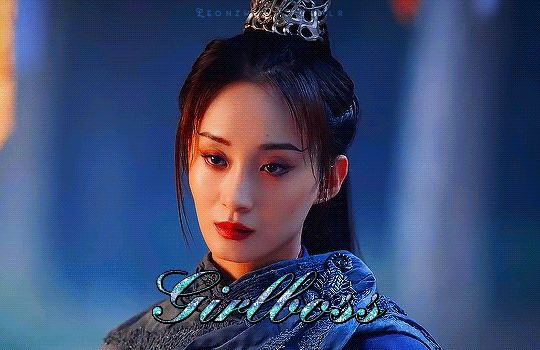
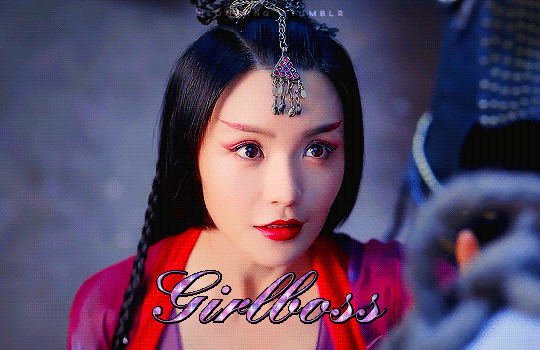
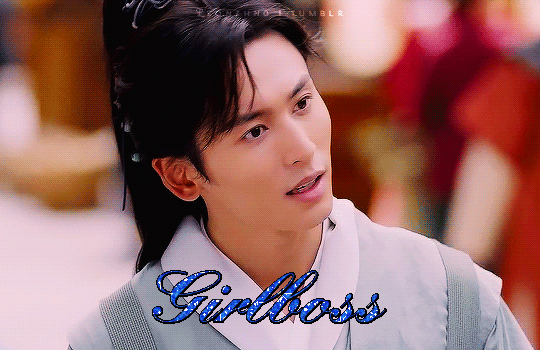
hello shan he ling tumblr i bestow upon you this shitpost (ノ◕ヮ◕)ノ*:・゚✧
chen qing ling version [x]
thank you glittertextonline[dot]com for the glitter text of my childhood
#shl#word of honor#shledit#priestnet#wohdaily#wohedit#wordofhonoredit#wen kexing#zhou zishu#zhao jing#shen shen#gu xiang#ke naiyu#liu qianqiao#luo fumeng#du pu sa#qiao luohan#tyk symbolism#*iii#*gfx#i hate myself for this too
4K notes
·
View notes
Text
Romance in MXTX, Priest, and SHL
MXTX: Flower, Wine and Dreamworld
The romance in MXTX's works is like flower that grows in ice and snow; colorful, bright and hopelessly romantic, blossoms in misery and hardships.
It features a distinct "us against the world" mindset, depicting love as the only constant in the world. It's an eternal "dreamworld" detached from worldly matters, the perfect escapism as well as a source of strengths in the face of cruel reality.
Both MDZS and TGCF are a critique of mob mentality.
The contrast between CQL and MDZS is very interesting. While the former ends with LWJ taking charge, and therefore changing the world for the better, the novel ends with wangxian isolating themselves from grand politics and focusing more on helping individuals as recluse. It has an essentially pessimistic attitude towards the morality & intelligence of the collective.
TGCF takes a slightly more optimistic approach, featuring the crowd being courageous under the right circumstances. However, both works share a similar undertone: putting one’s absolute faith in the collective is dangerous, whereas unconditional trust and devotion can be only found in one-to-one connection
MXTX herself compares MDZS and TGCF to 花间一壶酒 (A cup of wine among flowers), MDZS being the wine and TGCF being flower. She also compares MDZS to 风雪夜归人, the person returning home from snow and wind, and TGCF to 红泥小火炉, a small red furnace.
Priest: Breezing Wind and Burning Iron
The romance in priest's works is more complicated. It's the most gentle in its normal state, when it is rational and collected, in which case it's like the breezing wind, soothing, sweet and light-hearted. It gives the individuals more incentive to achieve their individual and/or societal vision, as well as more reason to value their own lives & well-being.
In Faraway Wanderers, the most distinct feature of WenZhou relationship is how in naturally sync they are, and how comfortable & smooth their dynamic is. They both have past burden, but it doesn’t matter, because they bring simple joy, understanding and happiness in each other’s lives.
In Sha Po Lang and The Guardian, the ML’s lingering love for the MC motivates them to become better version of themselves, to care about others, and to form a holistic vision about bettering society.
In The Defective, Lin Jingheng(MC) explicitly said that Lu Bixing(ML) is the only meaning in his life. He had little incentive to care about his own life after his revenge plan fell apart. LBX helped him reconnect with his inner idealism, and gave him a reason value his life.
When the passion and fiery energy manifests itself, however, the romance is like burning iron, blood and fire. It isn’t actually toxic or unhealthy, but it's not pure and innocent either; in this case, it strives for something deeper and more intense, never content with the past or the present. The sheer intensity of relationship is like a double-edged sword, walking the fine line between unconditional devotion and dangerous obsession.
SHL: Spring Water and Healing Open Wounds
The romance in SHL is like "spring water"; it's warm, gentle, nurturing. It breaks through the boundary between individuals to bring the couple closer to each other, taking them back to a utopia of their childhood dream, away from social pressure and responsibility. The theme central to their relationship is “salvation”: how love is able to bring people back to integrity.
Both drama wkx and drama zzs have lots of regret about their past sins and wrongdoings. Four Seasons Manor is essentially a metaphor for purity, acceptance and the safety of childhood home. How to make drama wkx open up and accept this safe harbor as his home is one of the most significant plot-lines of the show.
SHL couple is way more emotionally vulnerable and expressive. A significant part of SHL arc is healing the wounds in an open and honest way. They cuddle and confide in each other way more often, talk about their shameful past and even cry about their regrets in front of one another, which is very rare among MXTX/Priest works.
The heat of the relationship sometimes gets too hot and even burns; in other words, there are constant miscommunications, conflicts and misunderstandings in the relationship. However, they can never let each other go, because it's the only source of warmth left for them in their hopeless lives filled with regrets and guilt.
Similarities and Differences
*Note that this is not a SHL/TYK comparison. TYK is kind of an “unorthodox” priest novel; you will know what I mean if you have read 3+ of her works.
Relationship Dynamic & Narrative:
In MXTX’s works, the concept of “romance” itself is divined; and the characters are illustration of the ideal of “undying love”. People are made for one another, to complete one another. Her works use colorful symbolism (silver butterflies, the emperor’s smile, the 3 thousand lanterns, etc.) to depict this romanticized ideal of love.
For MXTX, the romanticization of “destined love” is one of the most recurring themes of her novels. Therefore, the readers look at their relationship through rose-color glasses. Obsession is usually framed in a jolly & romantic light, and doesn’t feature much tension or stress, and has less negative or unhealthy undertone.
In most of priest’s works and SHL, soulmates are not born but made, so they have to figure out how their relationship works step by step. Therefore the narrative is less of a “rosy picture”.
Priest has a habit of using derogatory terms to describe relationships that are mostly healthy, but somewhat “bloody” and edgy, full of excessive passion and obsession. The most common phrase is “爱生忧怖”, a Buddhist term meaning “love results in worry and fear”.
SHL obviously has to be more subtle in expressing love. That said, drama WenZhou are way more emotionally vulnerable and expressive than their novel counterparts, as well as most Priest & MXTX characters. They have a dramatic falling out once in a while, even towards the end. They barely fit the Chinese definition of Zhiji (to know me/to understand one another), but are “lovers” who are buried deep in their passion instead.
Past, Future and Evolvement:
In SHL, characters are encouraged to treasure past impressions that are thrown in figurative “wrappings”, whose luster is derived from age-old experiences (Psychological Types, Carl Jung). In other words, they are encouraged to root their love in a shared past, a Utopia of innocence.
The contrast between The Defective and Word of Honor is very interesting to observe. Both involve long separation, and the suffering and personality changes hat comes from it.
SHL narrative frames their innocent childhood as something to cling to and return to. Drama WKX is encouraged to accept his identity as Four Seasons Manor disciple because it was part of his childhood past. This is a significant part of drama WenZhou relationship.
In The Defective, the narrative doesn't encourage the couple to dwell on the past that much.
On the contrary, the all-knowing AI explicitly discouraged the MC from “comparing past to present”. They are advised to accept changes, however painful it might be, and build a better, more equal dynamic out of it, evolving from one-sided pandering to fighting side-by-side.
In Priest’s novels, the characters rarely return to something in the past, but look into the future. Change is usually framed as inherently beneficial, albeit usually painful and rocky, the implication being that you need to constantly strive for something better.
Sha Po Lang is a good example of this, with Gu Yun’s changing attitude towards Chang Geng after he as he matures, gradually showing his intelligence in politics. CG starts referring to GY as Zixi instead of YiFu is also a sign of this change---to see him as equal rather than a parental figure & protector.
The Defective is even more obvious in this regard, with both parties uncomfortable with the change initially, but gradually adjusting to the changes during their 16-year separation. The ML also stops calling MC by his surname “Lin”, as a sign of viewing him as equal.
In MXTX’s works, change in personality or relationship dynamic is neither framed as painful or good. It just happens. It’s a natural flow that take place when it does. Their relationships are rarely challenged by change. They are objectively at a better place compared to their past, but it’s merely the result of a series of events rather than a deliberate choice or struggle.
WangXian’s relationship naturally changes over time after WWX’s rebirth, but neither of them really struggles with the change.
Xie Lian doesn’t even recognize Hua Cheng as the someone from his past, so they start out as friends getting to know each other.
Salvation and Changing one another:
Priest herself stated in an interview that she doesn’t believe in the concept of salvation, since people have the inner capacity to be their own savior. Therefore, priest characters usually don’t actively try to change their partner’s morals or personality. Some might be willingly influenced by their partner, but there’s rarely an element of moral condemnation. Even when there is a conflict between different values, the options are 1) to reconcile them by choosing the middle ground 2) to maintain their independence and tackle it with nuance 3) to break up.
On surface level, Mo Du/Silent Reading is about Luo Wenzhou being Fei Du’s salvation. However, as LWZ pointed out himself, Fei Du would’ve been a good person at heart with or without his influence.
In The Defective, when Lu Bixing mistakenly thought Lin Jingheng stayed in the Eighth Galaxy against his own wishes because of their relationship, and that their priorities are irreconcilable, he even thought about breaking up. Of course he was not serious about it, but this showcased that he would never try to change LJH’s convictions.
In SHL, however, the concept of salvation is central to the theme. Some find it strange that SHL make drama zzs the more “moral” one of the two, despite his action being more objectively questionable. In fact, the only reason he get framed as more “moral” is that he admitted his fault sooner, and therefore could guide drama wkx’s path back to salvation: to recognize the goodness in people, make peace with external world, to clear his name in Jianghu, and to follow due process with his revenge plan to avoid collateral damages.
“I tried to change you, but you end up changing me”, said drama ZZS. This relationship dynamic is never present in any of priest’s works I’ve read. Priest characters don’t *try* to change one another.
Does MXTX believe in salvation? Hard to tell. One could argue that Hua Cheng would have be way more amoral and even immoral if it hadn’t been for XL. This is complicated and is a topic for another time.
However, it is certain that MXTX MCs don’t condemn each other morally. “The orthodox one defending their unorthodox partner in front of the world” is a common wuxia trope, but the way MXTX novels approach it is very different from SHL.
HuaLian never had a serious falling out about being on different sides. Even when they disagree, they respect each other and love each other exactly the way they are. Hua Cheng didn’t approve of Xie Lian saving Mu Qing, but he didn’t interfere with Xie Lian’s decision. Xie Lian feels responsible for helping Shi Qingxuan in Blackwater arc, but he is perfectly fine with HC helping He Xuan keep secrets. In several cases where they have different values, they are able to make it work with ease.
LWJ never *morally* condemned WWX for his action, and never once objected to WWX practicing demonic cultivation after his rebirth. In fact, LWJ never objected to WWX’s morals; in their previous life he was worried about his safety, and struggled with what to do about certain situations due to his family background, but difference in morality is not an issue for them.
The “righteous” one does not feel the need to guide their unorthodox partner or to be their salvation with regards to integrity.
*The similarity & differences part is a bit messy and some points are not fleshed-out. Sorry about that.
**I don’t claim to have the right interpretation. The lens by which we see different styles of romance is ultimately subjective.
213 notes
·
View notes
Text
TYK / SHL comparisons masterpost
comparisons tag — TYK meta masterpost — SHL meta masterpost
blanket forewarning: some of these use critical tone towards changes made in adaptation (mostly in wenzhou dynamic section). I generally try to put warnings on those posts, and do my best to explain my point of view as calmly and clearly as I can, but in case you'd rather skip those, I marked them on the list with ▧ symbol.
————
——> TYK/SHL comparisons, final cut < ——
+ short rundown of the changes without spoilers for the novel
————
structural changes
TYK’s and SHL’s main plots are not the same
Leaving or returning: TYK, SHL, and their differing approaches to the past + addition (title change) + addition (on Liu Qianqiao and Ye Baiyi’s arcs)
“My surname isn’t Rong”: on changes made to Wen Kexing’s parents’ story and how it ties into the genre shift
scene changes
“A-Xiang, do you think I’m crazy?”
▧ Scenes that don’t give off the same impression in adaptation + ◊ addition
Scenes from the novel that made it to SHL’s finale (all 6 of them)
◊ on Cao Weining’s and Gu Xiang’s deaths
character changes
Name changes between TYK and SHL + addition
changes to WenZhou dynamic
▧ Morality shift in SHL, and how it affected WenZhou dynamic + ◊ addition
▧ Valley Master reveal between TYK and SHL
▧ on the addition of shixiongdi relation in SHL
▧ similarities between Zhou Zishu’s and Liang Jiuxiao’s falling out in Qi Ye and SHL’s “you’re actually crazy” scene
▧ on miscommunications in SHL, from perspective of the novel’s fan
on the use of ‘Lao Wen’ nickname
◊▼ brief explanation of why relationship timelines can’t be compared between the novel and the show
similarities
Zhou Zishu and the Scorpion as narrative parallels
lore & other
◊ water of Lethe / Meng Po's soup
◊ Wen Kexing with white hair
————
▧ the post, or some part of it, is critical of SHL’s choices
◊ ask response
▼ mention or aside in another meta
118 notes
·
View notes
Note
What cnovels have your already read/ loved (other than the ones by mxtx)? What types of cnovels do you like to read? I'm trying Breaking through the Clouds (by Huai Shang, since I loved jmbnh so much), and have Pan Guan on my list on your rec.
OOOOO okay okay i've read MXTX's Big Three, Priest's Guardian & Tian Ya Ke, Xi Zixu's Kaleidoscope of Death & 聽說你想打我, Meng Xishi's Thousand Autumns, and Mu Su Li's Pan Guan. My mom recced Shui Qian Cheng's Sissy and while I did enjoy it fine as I was reading, once I put it down i also didn't pick it back up lmfao. Out of all these, I think my favorites (MXTX aside) are TYK, KoD, and Pan Guan, and it's mostly because of the main CP dynamics. I'm just a sucker for any ship that has such a deep understanding of each other that they don't really need to say anything to communicate.
Stylistically though, Panguan is hands down my favorite. The language is so fucking pretty, and what it does with imagery and symbolism knocks my socks clean off. (i SUPER REC IT AYYYYYY I'M SO HAPPY IT'S ON YOUR LIST)
not danmei, but I've also read Dreamer in the Spring Boudoir? I fucking LOVE that novel I've read it three times back to back I can't put it down. It's the mutual competency, it's the pride and prejudice relationship development, it's Ji Man being such an incredibly sexy scorpio i lose my mind.
I loved JMBNH mostly for its execution!!! The plot twists were so well-done, each layer intriguing but not excessively convoluted. The emotional payoffs were incredibly satisfying too. I also do love Thing!Deity/Human ships heheheheh it's the godfucker in me.
#that does remind me i want to read more by the author of Dreamer#okay okay i also have qqgk on my list#BUT IF YOU HAVE MORE RECS#HIT ME UP#danmei
8 notes
·
View notes
Text
I just finished reading the part of TYK where WKX and ZZS get trapped in the underground caves.
While they spend most of the time bickering, while Wen Kexing tries to figure out who Zhou Zishu is, and Zhou Zishu is trying to get him to back off. It's very much a "lock them in a closet and force them to interact" scenario. They sort of naturally work together, though, without saying anything explicitly. Wen Kexing saves Zhou Zishu at one point by catching a monster going for his back, and Zhou Zishu another time uses some sort of scent-hiding chemical to hide them both. Not that either of them is particularly gentle - Wen Kexing takes every opportunity to try and figure out why Zhou Zishu seems to be from Tian Chuang but is still walking and talking. He figures it out by the end of the trip, I think, which is why he doesn't really bring it up again. Zhou Zishu still has his polite face on but when Wen Kexing pokes him in the chest while the nails are acting up he starts swearing at him in a way that feels much more like how he is at the end of the book. And Zhou Zishu unabashedly uses Wen Kexing as bait. But, again, they never actually have to talk up a plan, they just move in sync effortlessly. Which is very sexy of them.
Zhou Zishu tries to save a girl who turns out to be one of the monsters and I think this is meant to signify an intentional change in his priorities. Rather than assume everything and everybody is out to get him, he chooses to take a risk in the hopes of helping somebody. Wen Kexing isn't that charitable, but he tears up a hankerchief he got as a love preasant from a famous male prostitute to dress Zhou Zishu's wound afterwards. Which is also pretty obvious foreshadowing/symbolism.
We also get Zhou Zishu hallucinating Jiuxiao standing under a flowering tree, probably something like his greatest regret. We don't know what Wen Kexing sees, but it's probably the death of his parents.
Finally we get Wen Kexing killing their captor before he can say anything incriminating and finding the crystal on his body. He gives it to Zhou Zishu who throws it away. I'm glad they kept that part in the show, although they elaborated around it quite a bit. Because that really seems to strike Wen Kexing close to home. This is a thing that everybody else is fighting over, something that most martial artists would really covet, but Zhou Zishu doesn't see it as having any value. Wen Kexing gives it to him because, probably, he thinks he can get it back whenever he feels like it, because it will just incite more violence, and because he wants to see what Zhou Zishu will do with it. But it turns out Zhou Zishu really is as carefree as he acts, he's not playing a game. This is probably the inspiration for Wen Kexing giving Zhou Zishu the hairpin in the show, although it happens much earlier and has different meaning. In SHL it's symbolic of Wen Kexing trusting Zhou Zishu completely (and their marriage lol). In TYK it's a test, which Zhou Zishu unexpectedly passes.
At the end when they get out Gu Xiang observes the two of them interact and comments that Wen Kexing is incredibly shameless while Zhou Zishu is extremely stubborn/contrary.
Wen Kexing: "Can I follow you? I'm going to whether you agree or not, though."
Zhou Zishu: "Be my guest (asshole)."
0 notes
Photo

Gertrud Lönegren(f.1905-1970) stentøjs skål for Rörstrand, med tyk mørkeblå glasur, for Rörstrand. Fra 1936-1941. Tekst: R med tre kroner(symbol) G.L. SVERIGE. Mål: Dia: 10,3 H:3,9 cm. Stand: fin stand,Se billeder. Flere billeder i webshoppen, www.zollantiques.dk Pris: 600 kr. #zollantiquesINTERIEUR#zollantiquesDESIGN#zollantiquesCERAMICS#zollantiquesBLUE #storekongensgade #københavnk #interiør #boligstyling #interieur#ceramics #keramik #kunsthåndværk #stengods #stoneware #midcenturymodern #swedishmodern #swedishdesign #vintageceramics #vintagestoneware #swedishstoneware #svenskkeramik #keramikskål #GERTRUDlönegren #rörstrand #støtdesmåbutikker #støtsoloselvstændige #støtsolovirksomheder #supportsmallbusiness #weCareDK (her: ZOLL Antiques. the pleasure of collecting) https://www.instagram.com/p/CU46n6GM8Eq/?utm_medium=tumblr
#zollantiquesinterieur#zollantiquesdesign#zollantiquesceramics#zollantiquesblue#storekongensgade#københavnk#interiør#boligstyling#interieur#ceramics#keramik#kunsthåndværk#stengods#stoneware#midcenturymodern#swedishmodern#swedishdesign#vintageceramics#vintagestoneware#swedishstoneware#svenskkeramik#keramikskål#gertrudlönegren#rörstrand#støtdesmåbutikker#støtsoloselvstændige#støtsolovirksomheder#supportsmallbusiness#wecaredk
0 notes
Quote
du smiler dit smil
som ikke rigtigt ligner et smil
men mere resultatet af en ordre
nogen har givet dig
om at smile
du siger lad være
med at tage billeder af mig
jeg føler mig tyk og i dag
er en dårlig dag
varmen gør noget ved dit hår
men jeg ville jo bare vise
at jeg kan drikke kaffe med dig
og luften er måske lidt tyk
men jeg håber
at det mest er røg
og ikke alle de usagte ting
der også eksisterer mellem os
og jeg ville jo bare vise
at du kan smile på snapchat
mens du ryger mine cigaretter
hvilket jeg synes er ok
at du gør
gavmildhed er jo at forlange
og sikkert også meget sundt
20 minutter senere
og du har 6 kr på din konto
en mand i en kiosk giver os
gratis cigaretter
og vi snakker om
hvor privilegerede vi er
mens vi sidder i bussen
på vejen til forstaden
din far tjener jo mange penge
fortæller du lidt henkastet
for det er jo ingen overraskelse
det gør man jo
og du smiler stadig dit smil
som stadig ikke rigtigt ligner et smil
men mere resultatet af en ordre
nogen har givet dig
om at smile
vi snakker om noget upcoming musik
du synes er nice
bussen stopper
jeg skal ud
du skal til en anden forstad
hos en af dine veninder
du har jo så mange veninder
og jeg siger
vi ses jo snart
mens jeg tænker på
hvornår vi mon ses
og om vi nogensinde ses igen
jeg træder ud af bussen
og tvivlen flyder i min krop
en tvivl der også er en vrede
over dine smil og dine blikke
som også kan føles som blikke
der er et resultat af en ordre
nogen har givet dig
og jeg tænker på det ting du sagde
og jeg tænker på de ting
du ikke sagde
det er stadig lunt
mens jeg går hjem
jeg sender en snap hvor jeg smiler
til en barndomsveninde
jeg skriver
at vi snart må ses
så vi kan drikke kaffe og snakke
om de ting der var engang
men ikke er her mere
det sidste skriver jeg dog ikke
i stedet tilføjer jeg emoji og tænker
at den måske kan være et symbol
på alle de ting jeg foretager mig
for ikke at føle mig alene
selvom jeg også godt ved
at jeg er det
søndagstanke
18 notes
·
View notes
Photo

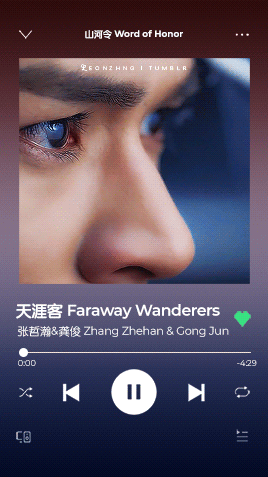


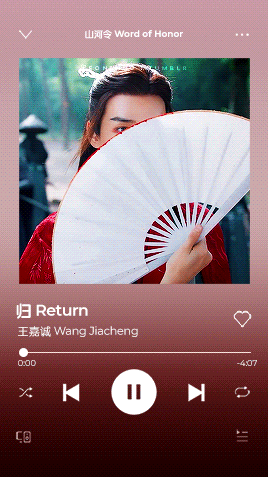

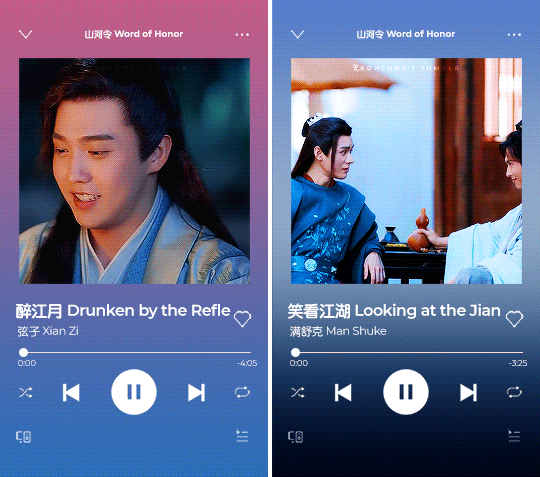

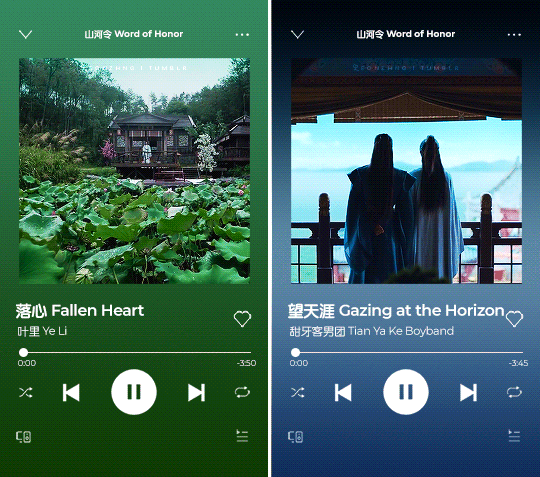

the soundtrack of shan he ling
note: 借月 was not written for the show but the lyrics fit it so well that they attained rights to use it in the special episode MV
[insp] [template]
#shl#word of honor#shledit#wordofhonoredit#cdramanet#cdramaedit#shlspoilers#wenzhou#wen kexing#zhou zishu#zhang zhehan#gong jun#gu xiang#cao weining#*gfx#tyk colours#tyk symbolism#tyk gifs#symbolism...??#*i#i love tian wen#and wu ti has a special place in my heart <3#i died at tian ya ke boyband
1K notes
·
View notes
Photo






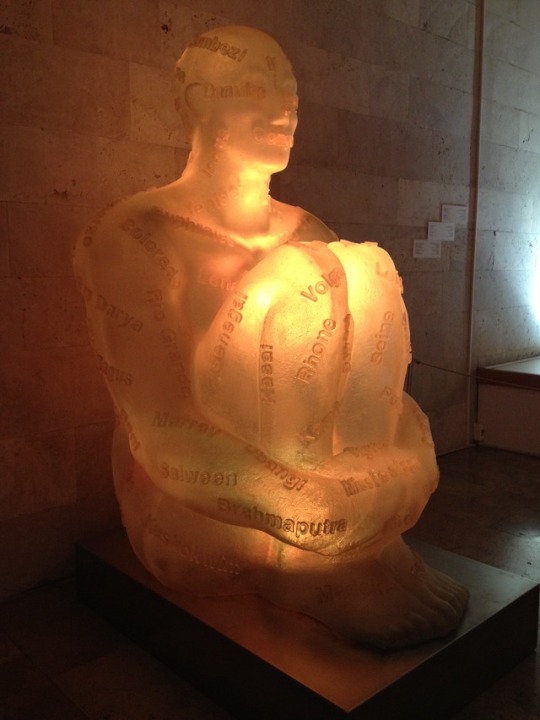
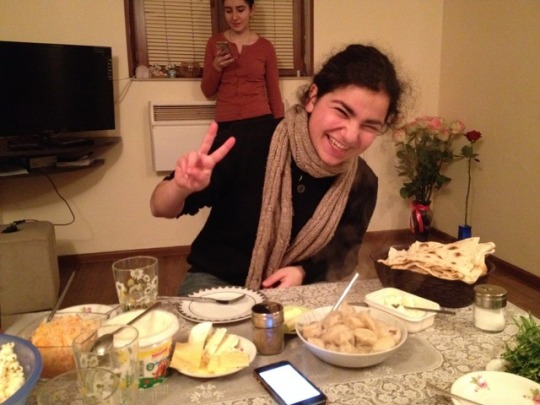
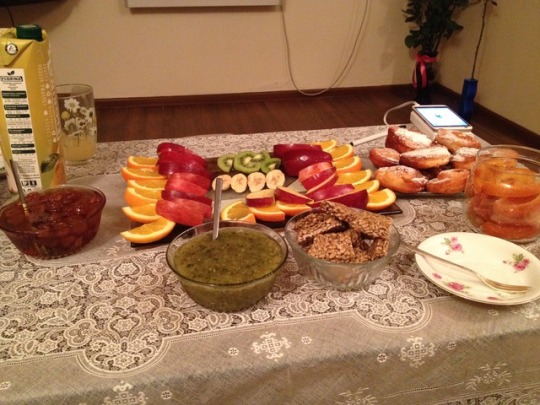

17/3 2017
Jeg har haft vildt travlt de sidste par dage! De første to dage hernede var rimelig stille og rolige, men så kom der ellers fart over feltet.
Først og fremmest mødtes jeg onsdag med min søde armenske ven Inessa, bedre kendt som Ines, som jeg boede på hostel med i Huang Shan i Kina sidste år og siden har holdt kontakten med. Det var VILDT fedt at mødes med nogen, og selvom det er et år siden, vi sidst har set hinanden (hvor det i øvrigt kun var to dage), føltes det alligevel, som om vi kendte hinanden godt.
Om formiddagen viste hun mig et par steder i Yerevan, blandt andet Den Blå Moske, som er den eneste fungerende moske i Armenien. Her blev vi vist rundt af en iransk dame (som i øvrigt var kristen) og fik et kig på det fine iranske porcelæn, de havde udstillet. Bagefter besøgte vi også en kirke. Dem er der en milliard af hernede, ligesom der er virkelig mange khachkar (udtales hatchkar) – store, rektangulære sten med udskæringer af udsmykkede kors. Mange af armenerne går i øvrigt med kors om halsen, og der hænger billeder af Jesus plus kors i vinduerne i de fleste busser. Armenien er ikke verdens ældste kristne nation for ingenting!
Ines skulle til en eksamen om eftermiddagen, så hun havde fået sin veninde Hasmik til at holde mig med selskab så længe. Vi besøgte blandt andet et fedt udendørs marked, hvor jeg fik styr på alle de armenske symboler: korset, selvfølgelig, en fløjte ved navn duduk, skak (det kan man få som skolefag!), granatæbler for some reason, og så bjerget Mt. Ararat, som er den store nationale stolthed, selvom det egentlig ligger i Tyrkiet efter moderne grænseoptegning. Bagefter tog vi sydpå til en park og fik i processen prøvet alle de forskellige offentlige transportmidler, Yerevan har at byde på. Der er en metro, som består af en enkelt linje, og som er meget fin med flotte buegange under jorden, men som primært bruges, hvis man skal lidt ud af byen, da kun to af stoppene ligger i centrum. Og så er der bus og marshrutka, som kører på vejene. Sidstnævnte er en lille minibus, som er lidt hurtigere end de store busser. Her må man, hvis man ikke får en siddeplads, stå krumbøjet og skrumple frem og tilbage, for der er ikke noget at holde fast i! Den offentlige transport og især marshrutka er vildt ‘laid back’ – der er stop, men man kan bare vinke af en marshrutka for at få den til at samle en op, og når man skal af, råber man ‘stop’ til chaufføren. Der er ingen skemaer eller tidsplaner; man stiller sig bare op ved et stoppested og venter på, at den rigtige linje kommer forbi. Og så betaler man i øvrigt ved at række mønter frem til chaufføren, når man står af, eller få andre til at gøre det. Det er et totalt tillidsbaseret system, og det er der egentlig noget ret fedt over.
Nu kom jeg igen ud af et sidespor... Ines blev færdig med sin eksamen, og vi mødtes igen og tog ud at spise. Om aftenen sad vi på mit hostel og spillede kort til sent. Næste morgen mødtes vi igen til en virkelig fed dag, hvor jeg fik nogle gode indblik i armensk hverdagsliv og følte mig meget autentisk ;) Først tog vi ud på Ines’ tidligere gymnasium, som på trods af sin placering i et støvet, glemt område var ekstremt moderne. Skolen var indrettet med et orange og grønt farvetema i lyse og lækre lokaler, og så havde de en masse fede science-ting udstillet i glasmontrer og malerier fra nogle seriøst talentfulde billedkunstelever hængende på væggen. Vi snakkede med et par af hendes gamle lærere, og det virkede virkelig, som om hun havde et godt forhold til dem. Og så var der... wait for it... en indendørs rutschebane!!! De havde simpelthen sat et kæmpe rutscherør op fra anden til første sal og fra første til stuen, så man kunne glide ned til frokost i kantinen! Hvor awesome er det lige?
Ines skulle til eksamen igen, så i mellemtiden forsøgte jeg at smutte på ekskursion til et Akropolis-inspireret tempel ved navn Garni. Da jeg nåede frem, regnede det dog så heftigt, at jeg havde svært ved overhovedet at få øje på templet. Tågen var desuden så tyk, at det, der skulle have været et eventyrligt bjerglandskab i baggrunden, i stedet lignede et tomt hul. Så jeg trillede tilbage til Yerevan (og blev snydt af taxamanden i processen, det måtte jo næsten ske på et tidspunkt), hvor jeg tog på det femetagers kunstgalleris indendørsafdeling. Jeg kunne fylde et helt indlæg med billeder derfra, men I får lige et – en stor, lysende skulptur af en mand med navnene på alverdens floder skrevet på kroppen!
Ines fiskede mig op på hostellet om aftenen, hvor hun bildte mig ind, at vi skulle ud at drikke te. Da jeg så småt var begyndt at undre mig over, hvorfor vi skulle et godt stykke ud af byen for det, trak hun en nøgle frem og låste op til sit hus! Og så blev jeg ellers modtaget med et stort kram af hendes mor og budt på lækker armensk middag (dumplings – det spiser de åbenbart også her) og overdådig dessertbuffet. Ud over moren bor Ines med sin mormor, sin 28-årige bror og hans kone. Sin far har hun ikke set, siden hun var seks.
Det var rigtig spændende at møde hendes familie, og vi hyggede os til ved 12-tiden, hvor jeg kørte hjem med taxa. Her troede jeg, jeg skulle i seng, men et enkelt spørgsmål om nogle praktiske detaljer udviklede sig til en to en halv time lang samtale med de to hostelgutter, der havde nattevagten, og min tyrkisk-armenske værelseskammerat, som også var oppe. Her fandt jeg blandt andet ud af, at alle armenske mænd er forpligtede til to års militærtjeneste, og at Armenien bruger 80 % (!!!) af deres nationale budget på militæret! De mange konflikter med nabolandende tærer hårdt på økonomien, og ifølge de to hostelfyre ville Armenien være et af de mest veludviklede lande, hvis ikke de brugte så ekstremt mange penge på grænsekampe. Det er alligevel ret vildt.
Nu er jeg taget en tur sydpå, og den første halve dag med det har allerede været ekstremt spændende, men den historie må I få en anden gang. Men inden jeg slutter, får I lige et par ord om kommunikationen hernede. Sprogbarrieren er ret massiv, og det kræver virkelig noget arbejde at gøre sig forstået. Det er ikke mange over 30, der kan mere end et par få ord på engelsk, og jeg kan jo ikke en bønne armensk. Til gengæld havde jeg min første ”samtale” på russisk i tirsdags! Ekstremt basal, men alligevel. Jeg forstod, at jeg blev spurgt, om jeg kunne snakke russisk, og jeg sagde ’en lille smule’. Og så forstod jeg, at den venlige mand spurgte om mit navn, og det svarede jeg så på. Og så rakte det ikke til så meget mere ;) Men jeg er rigtig glad for, at jeg brugte lidt tid på at studere russisk, inden jeg tog af sted. Langt de fleste armenere kan snakke sproget, og jeg har haft flere oplevelser efter den første, hvor jeg blev forstået ved at sige et par enkeltord på russisk. Det er super skægt at kunne kommunikere bare en lille smule, og så er det guld at kunne det kyrilliske alfabet, allerede her i Armenien. Jeg er også ved at have styr på de armenske bogstaver efterhånden; har skrevet en lille guide til mig selv i min notesbog og gjort det til en vane at stoppe op med jævne mellemrum for at dechifrere et vejskilt, så nu kan jeg snart alle de mest almindelige. Til gengæld kæmper jeg stadig med at huske, hvordan man siger ’tak’ (et ord på fem stavelser). Heldigvis kan man jo også bare sige ‘spasibo’ eller endda ‘merci’, for de elsker åbenbart fransk hernede.
Anyways, nu vil jeg smutte. Jeg sidder på et lille B&B i bjergbyen Goris, hvor der til min store forbavselse viste sig at være wifi, så I kunne få indlægget her. Godnat!
2 notes
·
View notes
Text
You know, I’ve been talking a lot about changes made to TYK’s narrative choices in adaptation, but there’s one thread that, surprisingly, made it into the show – despite both characters involved being transformed beyond recognition from their novel counterparts:
the parallel between Zhou Zishu and the Scorpion.
In the novel, Scorpion is an ambitious and cunning man who manipulates events from behind the scenes for his own goals. His methods are unscrupulous, no deed is too dirty; the ends, in his opinion, very much justify the means.
This description, of course, also applies to Zhou Zishu, especially as he is in Qi Ye. Both Scorpion and Zishu had commited abominable things for the sake of their goals – there are, indeed, echoes of Zhou Zishu’s Qi Ye crimes in several things Scorpion does in Tian Ya Ke, – and both of them are very much unapologetic about them.
The only difference is that Scorpion’s goal is to elevate himself, while Zhou Zishu, as Lord Seventh puts it in chapter 67, “has done those deeds that the heavens would strike him down for, but not one of them was committed out of selfish desires for his own ends” – and it is exactly this discrepancy that eventually allows Zhou Zishu to put that life behind him.
In the narrative, the Scorpion serves as a ‘dark mirror’ parallel to Zishu – the worst possible version of him, so to speak. Their last confrontation, then, becomes a symbolic victory over that aspect of himself for Zishu, coming on the heels of him realizing he no longer wants to be a chessmaster watching over the board from the shadows and tearing the last mask off his face.
The adaptation, of course, could not portray Zhou Zishu exactly as he is in the novels – an unapologetically murderous protagonist was not going to fly with the c-nsorship, for one. So the things that novel Zishu had done of his own volition, because he believed them necessary, show Zishu was manipulated into.
Now, when watching the show, I initially did not understand the decision to change the relationship between Scorpion and Zhao Jing. In the novel, Scorpion is the one who plays Zhao Jing (as well as his other clients) to eventually reap the benefits for himself; in the show, it is Zhao Jing who is manipulating the Scorpion.
But this shift does work to preserve the parallel between Zishu and the Scorpion. In the show, both of them are exploited as tools of bloodshed by those with great ambitions; both of them eventually cripple the men they used to follow. The Scorpion still functions as a dark mirror of what Zhou Zishu has been and could become, and it is only Zhou Zishu’s resolve in disentangling himself from Prince Jin that sets them apart.
––––––
- TYK/SHL comparisons masterpost -
- tyk meta masterpost -
#it IS impressive that they managed to keep the parallel with all the changes they were making but ah. i do not get why this parallel#was worth preserving while two out of three central themes were thrown out the window...#eh. i just thought this was curious#tyk shl comparisons#tian ya ke meta#word of honor meta#tian ya ke#tyk#faraway wanderers#word of honor#woh#shan he ling#shl#priest novels
94 notes
·
View notes